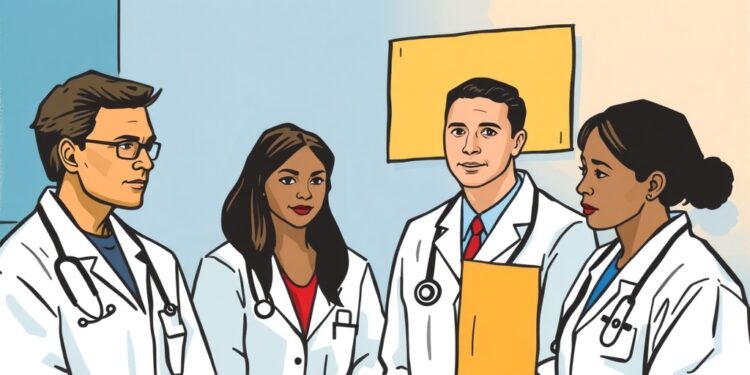In recent years, there has been a significant shift in the landscape of medical training, particularly in the realm of residency programs. A new survey study sheds light on the growing trend among resident physicians who either advocate for or are actively part of unionization efforts at their institutions. This development is fueled by a multitude of factors, primarily focused on the need for improved pay and financial security. With the burden of medical education debt looming large over many young physicians, these issues have come to the forefront of discussions concerning the rights and well-being of medical professionals.
The findings from the survey indicate that a substantial portion of resident physicians considers unionization not only a viable option but also a necessary step toward achieving fair compensation and better work-life balance. With resident salaries often perceived as inadequate compared to the demanding nature of their training, many physicians are voicing their support for collective bargaining as a means to negotiate terms that reflect their contributions to the healthcare system. This sentiment resonates deeply within the community, highlighting the importance of financial security as a motivator for union involvement.
Moreover, the survey reveals that while financial considerations are paramount, they are not the sole reason behind the push for unionization. Many residents expressed concerns about their work hours and overall well-being, which play a critical role in their professional lives. The demanding hours typical of residency can lead to burnout and fatigue, prompting a call for reforms that address these issues. Unionization emerges as a potential avenue for advocating regulatory changes that protect the rights and health of these medical professionals.
As the discussion surrounding unionization gains momentum, it raises important questions about the efficacy of such movements in achieving their stated goals. Does unionization lead to increased pay, enhanced benefits, and improvements in work conditions? These are critical areas that warrant further investigation, and researchers are encouraged to explore the tangible outcomes of union participation in the medical field. Insights gained from these future studies could inform strategies for effective advocacy and policy development tailored to the needs of resident physicians.
The research indicates a strong desire among medical professionals for financial autonomy and equitable treatment within their workplaces. The current questions surrounding pay disparities reflect broader societal conversations about labor rights and the value of a medical education. Unionization, in this context, serves not only as a means to negotiate salaries but also as a platform for amplifying the voices of resident physicians and pushing for systemic change in the medical education landscape.
Furthermore, the involvement of resident physicians in unionization efforts signals a broader trend of activism within the healthcare workforce. As awareness grows regarding the challenges faced by medical professionals, it fosters a culture of solidarity and collective action. This momentum can potentially reshape the dialogue around labor relations in medicine, encouraging other medical professionals to advocate for their rights and prioritize their well-being.
Supporting this movement, institutions must consider the perspectives and needs of their residents. Engaging in meaningful dialogue with resident physicians can pave the way for collaborative initiatives that address their concerns. Active listening and responsiveness from leadership are crucial for bridging the gap between administration and residency programs. Creating a culture of support and understanding can reinforce the sense of community essential for the growth and development of future healthcare leaders.
The implications of unionization extend beyond immediate financial benefits; they encompass a broader commitment to improving the overall healthcare environment. By enhancing the experiences of resident physicians, institutions can foster a healthier, more sustainable workforce that ultimately benefits patients and the healthcare system at large. Addressing issues related to work hours, mental health, and job satisfaction are integral components of this effort, making it ever more crucial that residency programs prioritize these areas in their policies.
In light of the findings, it is evident that unionization represents one of many pathways toward addressing the challenges faced by resident physicians. Collaborative approaches that involve input from multiple stakeholders—including residents, institutional leaders, and policymakers—will be essential in enacting meaningful changes. As the healthcare landscape continues to evolve, the ongoing dialogue surrounding unionization will play a vital role in shaping the future of medical training and practice.
Engagement with these emerging trends and discussions is not just timely; it is necessary for the well-being of medical professionals and the patients they serve. By prioritizing the voices of resident physicians and supporting their efforts for collective action, the medical community can work toward a more equitable, just, and productive healthcare environment. This underscores the importance of continued research and advocacy in promoting the rights and well-being of those who dedicate their lives to healing others.
As the conversation about unionization evolves, it holds the potential to redefine the relationship between medical professionals and their institutions. The resonance of these issues underscores a collective desire for change that prioritizes health, well-being, and justice for all residents. Ensuring that resident physicians are equipped with the necessary support and resources will ultimately build a foundation for a thriving, sustainable healthcare workforce in the years to come.
In summary, the movement towards unionization among resident physicians is reflective of larger societal dynamics at play within the medical profession. As financial pressures mount and discussions about work conditions grow louder, the momentum surrounding collective bargaining will continue to influence the trajectory of medical training. This pivotal moment calls for both introspection and action, as the voices of resident physicians pave the way towards a more equitable healthcare future.
Subject of Research: Resident Physicians’ Support for Unionization
Article Title: The Undercurrents of Unionization in Medical Residency Programs
News Publication Date: [Not mentioned in provided content]
Web References: [Not mentioned in provided content]
References: [Not mentioned in provided content]
Image Credits: [Not mentioned in provided content]
Keywords: Resident Physicians, Unionization, Financial Security, Work Conditions, Healthcare Workforce, Labor Rights, Medical Training, Advocacy, Collective Bargaining.




